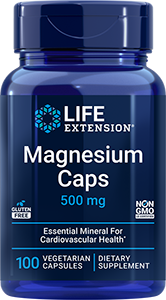- Science & Research
- Science News
- Newsletter
- 2007
- March 30

Newsletter
Newsletter
Nutrient combo helps prevent hearing loss
 | ||||||||||||||||||||||||||||||
| ||||||||||||||||||||||||||||||
| ||||||||||||||||||||||||||||||
| Life Extension Update Exclusive Nutrient combo helps prevent hearing loss A report published online in the journal Free Radical Biology and Medicine described the discovery of researchers at the University of Michigan that including a combination of antioxidant vitamins and magnesium in one’s nutritional regimen may help prevent noise-induced hearing loss. Josef M. Miller MD, who is a professor in the Department of Otolaryngology at the University’s Medical School, along with Colleen G. Le Prell, PhD and Larry F. Hughes treated guinea pigs with one of the following: vitamins A, C and E; magnesium; A, C and E plus magnesium, or a placebo one hour before and five days after a five hour exposure to 120 decibel sound pressure level noise (comparable to a jet engine at take-off). Although neither antioxidants nor magnesium alone appeared to be protective, animals that received both had significantly less hearing loss and sensory cell death than the other groups. The finding may be useful in developing a protective nutritional therapy for men and women whose employment involves significant exposure to noise, such as military occupations. The protective mechanisms produced by pretreatment with the nutrients are a reduction in free radicals that form in the cochlea of the inner ear during and after noise exposure, and decreased constriction of blood flow to the inner ear. The nutrients may also have minimized damage to the auditory neurons caused by overstimulation. Treatment administered after noise exposure scavenged the free radicals that continue to from. "Free radical formation bursts initially, then peaks again during the days after exposure," Dr Le Prell explained. "These agents have been used for many years, but not for hearing loss. We know they’re safe, so that opens the door to push ahead with clinical trials with confidence we’re not going to do any harm," Dr Miller stated. "Ultimately, we envision soldiers would have a nutritional bar with meals and it would give them adequate daily protection." "Other people would likely benefit by consuming a pill or nutritional bar before going to work in noisy environments, or attending noisy events like NASCAR races or rock concerts, or even using an iPod or other music player," Dr Le Prell added. "Based on an earlier study with other antioxidant agents, we think this micronutrient combination will work even post-noise." "Similar combinations have been very effective in preventing macular degeneration, and many of these agents have been used with Alzheimer’s and Parkinson’s diseases, stroke-like ischemia, and other conditions that involve neural degeneration," she noted. "You’re always hoping as a basic scientist to find a commonality like that, across other disease processes.” Tinnitus is a subjective disorder characterized as chronic ringing, roaring, buzzing, humming, chirping, or hissing in the ears in the absence of environmental noise (ATA 2002). Symptoms of tinnitus are frequently found in elderly persons and are often associated with hearing loss related to the aging process (presbycusis). Although the cause is usually unknown, tinnitus can be a symptom of almost any ear disorder, including infection (otitis media), a blocked ear canal (ear wax) or eustachian tube, otosclerosis (overgrowth of bone in the middle ear), labyrinthitis, and Meniere's disease. Even blast injury from explosions has been known to cause symptoms of tinnitus. Additionally, adverse side effects from some drugs (e.g., aspirin and antibiotics) cause tinnitus symptoms. People in large cities are exposed to potentially damaging loud noises on a daily basis. Studies have shown that noise exposure causes magnesium to be excreted from the body (Mocci et al. 2001). It is possible that supplementing with magnesium could reduce noise-induced ear damage and thus reduce the likelihood of new-onset tinnitus. Few studies document that magnesium relieves tinnitus symptoms, but many patients have experienced relief by using magnesium (Attias et al. 1994). Featured Products Folic acid supplementation slows hearing loss The January 2, 2007 issue of the Annals of Internal Medicine published the finding of researchers at Wageningen University and Wageningen Centre for Food Sciences, and University Hospital Maastricht in the Netherlands that supplementing older men and women with folic acid slowed age-related hearing loss. Previous research has found an association between diminished hearing and reduced levels of the vitamin. | ||||||||||||||||||||||||||||||
| If you have questions or comments concerning this issue or past issues of Life Extension Update, send them to ddye@lifeextension.com or call 1-800-678-8989. For longer life,  Dayna Dye Sign up for Life Extension Update at News Subscription Help spread the good news about living longer and healthier. Forward this email to a friend! View previous issues of Life Extension Update in the Newsletter Archive. | ||||||||||||||||||||||||||||||
The latest news on aging, nutrition, and vitamins
Lab
Testing
How Life Extension lab testing works

